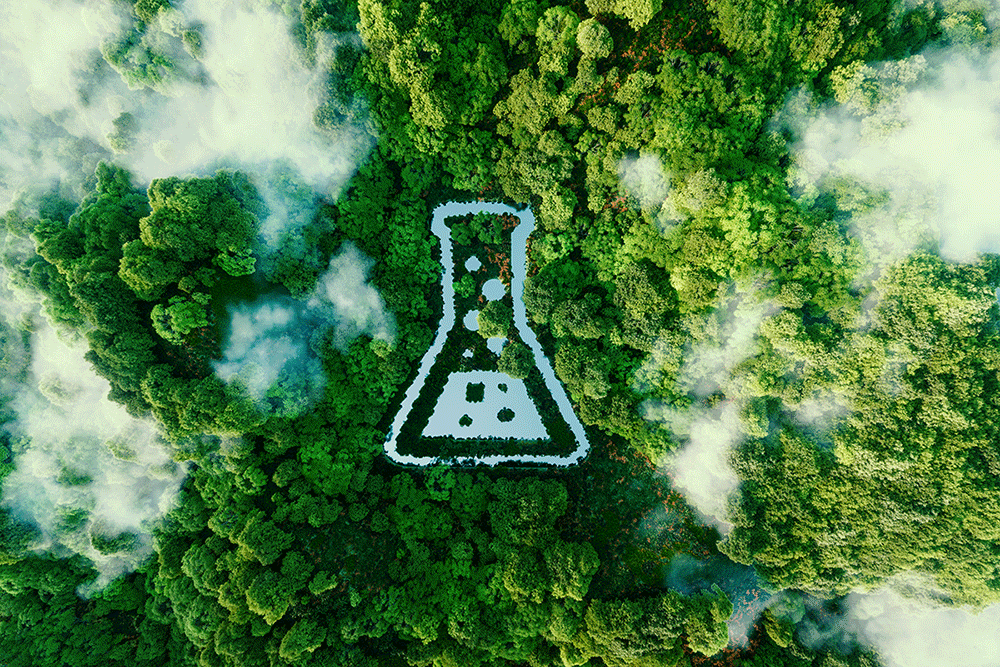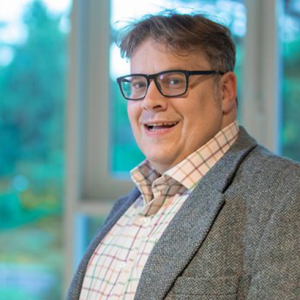
November 14, 2023, by sustainablenottingham
Interview with Pete Licence, the Director of the GSK Carbon Neutral Laboratories for Sustainable Chemistry
This month we met with Pete Licence, the Director of the GSK Carbon Neutral Laboratories for Sustainable Chemistry on Jubilee campus. Pete has been involved in sustainability and green chemistry since he joined the university in 2000. He is currently one of the permanent members of the university’s Environmental Sustainability Committee. He represents the research community, particularly aspects which are driving towards sustainability within the physical and life sciences.
Can you tell us about your work at the university?

Pete Licence
At the Sustainable Chemistry Centre for Doctoral Training, we have trained ten successive cohorts of PhD students to deliver smart solutions to industrially viable problems. These are problems that touch everyone in society. We have looked at the formulation of the deodorants that people put on the in morning, the materials in the chairs you sit on. Everything we do every day involves chemical use, and what really excites me is reducing the environmental impact of this.
Much of my work now is about engaging with industry to use core technical skills and experience in addressing problems like efficiency in processing, formulation, molecular structures and functional materials.
“Everything we do every day involves chemical use, and what really excites me is reducing the environmental impact of this.”
Could you share a specific moment or event that inspired your commitment to sustainability or made you realize its significance in today’s world?
A long, long time ago in the galaxy, far, far away, when I was a PhD student, I was a synthetic organic chemist. When I finished my PhD, I made 15 milligrams of a compound. I vividly remember sitting on the train to Nottingham, in fact en-route to an interview with Martyn Poliakoff, thinking about how much waste it had generated. The hundreds of kilos of silica, the thousands of litres of solvents, the salt wastes, all of the energetic materials that are used in that synthesis, and I really, really did think that there must be a better way of doing chemistry.
When I thought about the synthesis that I’d done, it was so small, and that the chemicals industry that we’re all dependent upon is so large. That production of waste is clearly not scalable, certainly if we want to have an environment that’s worth living in. So the driving force was really quite personal and, by luck, I managed to meet Martin Poliakoff and was given an opportunity to do cutting edge work in the field of green industrial chemistry using clean solvents to make smart processes.
“The theme in my work is about driving the chemistry to be much more energetically and materially sensible. I pursue atom economy and energy economy in anything that I do.”
Since then, I have worked on many diverse projects; from working with Lubrizol on engine oil additives and catalytic chemistry, to projects with Rolls Royce on paints that are reactive to heat to help understand the temperatures inside a jet engine, and on electrochemistry for synthetic transformations, one of the most sustainable methods for driving chemical transformations.
Are there any projects or initiatives that you have been involved with on the committee that you are particularly proud of?
The one I am most proud of is the determination of a science-based target for decarbonisation. As a result, we were in a group universities of early adopters, of science based targets to inform a decarbonisation plan, providing us with a true reference point for evaluating our progress against roadmaps or the UN Sustainable Development Goals. Having a science-based approach is now becoming the universal language used by large organisations to demonstrate their progress on carbon reduction. It is comparable and standardised allowing us to have a demonstrable, evidenced plan of action, and not just be adding greenwash.
Another project which I think is important is the Carbon Neutral Laboratories, which in themselves are a large-scale experiment. In this building we are defining better ways of working, consuming a fraction of the energy and the resources of a traditional lab. Intrinsically reducing our CO2 emissions associated with heating and electricity before we even consider the impact of the chemistry. This is one of the best places in the world to do sustainable chemistry, we are doing high impact chemistry in a low impact environment.
“This is one of the best places in the world to do sustainable chemistry, we are doing high impact chemistry in a low impact environment.”
Labs are some of the most resource-intensive places at a university. Find out more about UoN’s innovative work to reduce their environmental impact and how all lab users can get involved.
No comments yet, fill out a comment to be the first

Leave a Reply